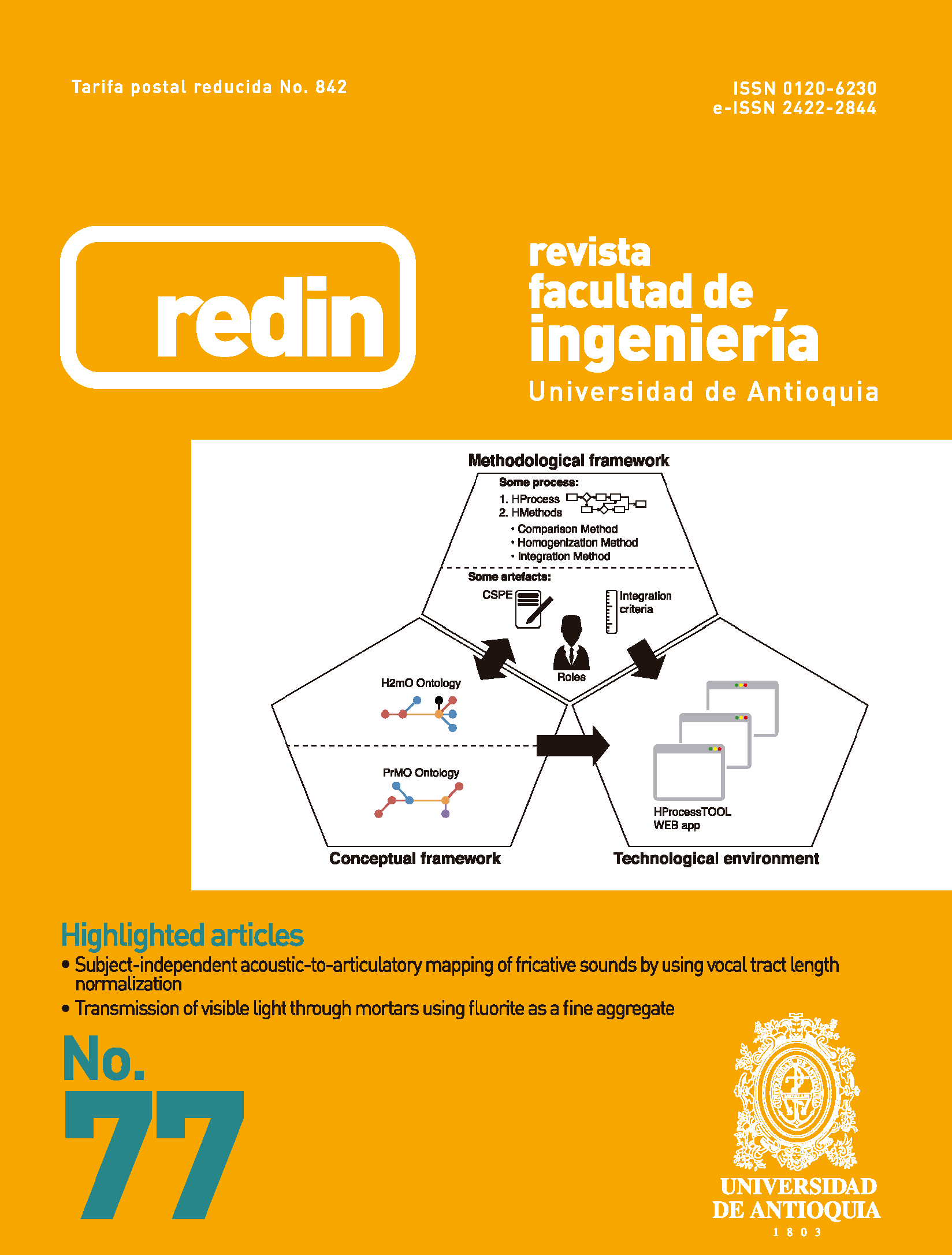Ayudando a las organizaciones a dirigir su esfuerzo hacia la implementación de mejoras en sus procesos software
DOI:
https://doi.org/10.17533/udea.redin.n77a14Palabras clave:
patrones de procesos, esfuerzo de mejora, pymes, punto de inicio de mejora, mejora de procesos softwareResumen
Debido a la importancia de las pequeñas y medianas empresas (pymes) de desarrollo de software para la industria del software, es importante garantizar la calidad de sus productos, para lo cual la mejora de sus procesos ofrece un camino atractivo para lograrlo. Desafortunadamente, la falta de conocimientos que existe en las pymes sobre cómo o dónde dirigir su esfuerzo de mejora hace que la implementación de mejoras sea un camino lleno de obstáculos, la mayoría de veces imposible de lograr. Este artículo presenta un marco de trabajo cuyo objetivo es ayudar a las pymes a encontrar un punto de inicio para dirigir sus esfuerzos de mejora, basado en la identifi cación de sus problemas principales. Además, el marco de trabajo proporciona una guía para iniciar la implementación de la mejora (punto de inicio), referente a los modelos, estándares y/o metodologías ágiles que pueden ser usados como referencia, basada en sus necesidades, características y cultura de trabajo. Finalmente, el artículo incluye un caso de estudio en el que se muestran los resultados de la implementación del marco de trabajo en cuatro pymes de la región de Zacatecas.
Descargas
Citas
G. Gómez, A. Aguileta, G. Ancona and O. Gómez, “Avances en las Mejoras de Procesos Software en las MiPyMEs Desarrolladoras de Software: Una Revisión Sistemática”, Revista Latinoamericana de Ingeniería de Software, vol. 2, no. 4, pp. 262-268, 2014.
Centre for Strategy & Evaluation Services (CSES), “Evaluation of the SME Definition”, CSES, Kent, UK, Final Report, Sept. 2012.
ProMéxico, PyMES, eslabón fundamental para el crecimiento en México, 2014. [Online]. Available: http://www.promexico.gob.mx/negocios-internacionales/pymes-eslabon-fundamental-para-el-crecimiento-en-mexico.html. Accessed on: Sept. 17, 2015.
Asociación Mexicana de la Industria de Tecnologías de Información (AMITI), “Esquema de Apoyo Gubernamental a la Industria del Software”, AMITI, México, D. F., México, 2001.
T. Williams, “How do organizations learn lessons from projects; and do they?”, IEEE Transactions on Engineering Management, vol. 55, no. 2, pp. 248-266, 2008.
M. Muñoz et al., “Expected Requirements in Support Tools for Software Process Improvement in SMEs”, in 9th Electronics, Robotics and Automotive Mechanics Conference (CERMA), Cuernavaca, Mexico, 2012, pp. 135-140.
C. Valtierra, M. Muñoz and J. Mejia, “Characterization of software processes improvement needs in SMEs”, in International Conference on Mechatronics, Electronics and Automotive Engineering (ICMEAE), Cuernavaca, Mexico, 2013, pp. 223-228.
M. Muñoz, G. Gasca and C. Valtierra, “Characterizing SME’s needs for implementing a software process improvement: A comparative between the reality and the theory”, Revista Ibérica de Sistemas y Tecnologías de Información, no. E1, pp. 1-15, 2014.
K. Petersen and C. Wohlin, “Context in Industrial Software Engineering Research”, in 3rd International Symposium on Empirical Software Engineering and Measurement, Lake Buena Vista, USA, 2009, pp. 401-404.
P. Clark and R. O’Connor, “The situational factors that affect the software development process: Towards a comprehensive reference framework”, Journal of Information and Software Technology, vol. 54, no. 5, pp. 433-447, 2012.
B. Duron, M. Muñoz and J. Mejía, “Estado actual de la implementación de mejoras de procesos en las organizaciones software”, in 8th Iberian Conference on Information Systems and Technologies (CISTI), Lisbon, Portugal, 2013, pp. 856-862.
S. Ambler, An Introduction to Process Patterns, AmbySoft Inc. White Paper, 1998. [Online]. Available: http://www.ambysoft.com/downloads/processPatterns.pdf. Accessed on: Sept. 17, 2015.
J. Coplien, “A development process generative pattern language”, in 1st Conference on Pattern Languages of Programs (PLOP), Monticello, USA, 1994. pp. 1-34.
B. Appleton, “Patterns for conducting process improvement”, in 4th Conference on Pattern Languages of Programs (PLOP), Monticello, USA, 1997, pp. 1-19.
Descargas
Publicado
Cómo citar
Número
Sección
Licencia
Derechos de autor 2015 Revista Facultad de Ingeniería Universidad de Antioquia

Esta obra está bajo una licencia internacional Creative Commons Atribución-NoComercial-CompartirIgual 4.0.
Los artículos disponibles en la Revista Facultad de Ingeniería, Universidad de Antioquia están bajo la licencia Creative Commons Attribution BY-NC-SA 4.0.
Eres libre de:
Compartir — copiar y redistribuir el material en cualquier medio o formato
Adaptar : remezclar, transformar y construir sobre el material.
Bajo los siguientes términos:
Reconocimiento : debe otorgar el crédito correspondiente , proporcionar un enlace a la licencia e indicar si se realizaron cambios . Puede hacerlo de cualquier manera razonable, pero no de ninguna manera que sugiera que el licenciante lo respalda a usted o su uso.
No comercial : no puede utilizar el material con fines comerciales .
Compartir igual : si remezcla, transforma o construye a partir del material, debe distribuir sus contribuciones bajo la misma licencia que el original.
El material publicado por la revista puede ser distribuido, copiado y exhibido por terceros si se dan los respectivos créditos a la revista, sin ningún costo. No se puede obtener ningún beneficio comercial y las obras derivadas tienen que estar bajo los mismos términos de licencia que el trabajo original.










 Twitter
Twitter